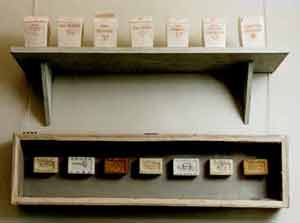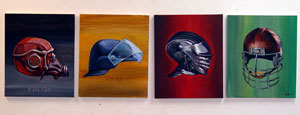|
 The title of the exhibition Seven
Wonders – Seven Sins refers to the seven world wonders and/or to the seven
mortal sins. The inspiration for the exhibit comes from past times, from the
Christian ethics, but it actually turns out to be directed towards the
contemporary cultural situation, interpreted by a group of artists from a
Balkan country, with the goal to be presented into another, neighbour Balkan
country. Each of the artists, avoiding the illustrative one-sidedness the theme
could suggest, has created works, which try to play the role of a peculiar key
to the philosophical and concrete understanding of the human life, which is
situated somewhere between the “wonders” and the “sins”. The title comes from
Elena Panayotova’s series of objects bearing the same title but the title of
the exhibit has not been chosen accidentally but as an answer to the question
what is the Bulgarian artist doing nowadays? Do his works concern the religion,
morality, everyday life, and the realization of big or small ideologies? Or
perhaps he is interested in the beauty, or on the contrary – he strives for an
impact by using extremely radical approaches and practices? To some extent it
could be claimed that all this partially, eclectically and chaotically creates
the image of an overall picture. The artist-interpreter keeps moving in the
value scale between the wonderful and the terrible things looking at the cracks
of their problematic social realization. The title of the exhibition Seven
Wonders – Seven Sins refers to the seven world wonders and/or to the seven
mortal sins. The inspiration for the exhibit comes from past times, from the
Christian ethics, but it actually turns out to be directed towards the
contemporary cultural situation, interpreted by a group of artists from a
Balkan country, with the goal to be presented into another, neighbour Balkan
country. Each of the artists, avoiding the illustrative one-sidedness the theme
could suggest, has created works, which try to play the role of a peculiar key
to the philosophical and concrete understanding of the human life, which is
situated somewhere between the “wonders” and the “sins”. The title comes from
Elena Panayotova’s series of objects bearing the same title but the title of
the exhibit has not been chosen accidentally but as an answer to the question
what is the Bulgarian artist doing nowadays? Do his works concern the religion,
morality, everyday life, and the realization of big or small ideologies? Or
perhaps he is interested in the beauty, or on the contrary – he strives for an
impact by using extremely radical approaches and practices? To some extent it
could be claimed that all this partially, eclectically and chaotically creates
the image of an overall picture. The artist-interpreter keeps moving in the
value scale between the wonderful and the terrible things looking at the cracks
of their problematic social realization.
The participating artists are
among the representatives of the generation that appeared in
Bulgaria in the 90s. At
present, this generation is situated between the first Bulgarian conceptual
artists from the 80s and between the youngest artists that are being
establishing their artistic ideas. In the 90s a critical pathos was typical of
these authors and to some extent that explains why Ivan Kiuranov’s dolls were
born out of soldiers, and Dimitar Yaranov’s canvases and Peter Tzanev’s posters
show a personality split by its psychological fears. Thus, the “wonders” and
the “sins” from the title are a metaphor of the socio-psychic pressure
inherent to that “generation of the transition”. On the other hand, the
exhibition has a relatively traditional visual code – most of the authors
insist they make painting or other forms of material objectivism. In that
sense, one of the main characteristics of that exhibition lies in the fact that
its conceptual motivation has not been disclosed
by its usual means of
expression but has been implanted and decoded in a post-objective depiction.

The exhibition strives to find
the crossing point in the various receptions of the authors, who interpret
Bulgarian traditions and contemporary global culture – “the sins” and “the
wonders” of contemporary day - the way we are able to realize them.
|